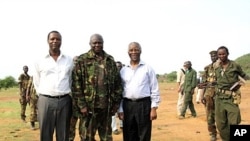Sudanese parties have opened final negotiations in Addis Ababa aimed at resolving several difficult and potentially divisive issues that need to be settled by the South’s July 9 independence day. The negotiators were advised they must keep working until a deal is reached.
With just over three weeks until the birth of a new nation, north and south Sudan face a daunting array of potentially explosive questions. Among them, how to divide revenue from oil to be produced in the newly-independent south, and sensitive issues about who will be a citizen of which country.
Preliminary talks have been described as contentious, with the two sides far apart.
As they sat down together Friday for a final push for agreement, the chief mediator, former South African president Thabo Mbeki told the assembled negotiating teams that failure would be unacceptable. Flanked by chief negotiators Idriss Abdul-Gadir of the north and Pagan Amoum of the south, Mbeki said ground rules for the talks are that no one leaves until an agreement is ready for signature.
MBEKI: "There are still quite a few matters that need to be decided upon and our co-leaders here to my extreme left and my extreme right have said to me that I must say to the meeting, We shall sit here until we agree on all outstanding matters and that both delegations are indeed committed to do that. Am I right?"
PAGAN: "Yes, you are right"
MBEKI: "Am I right?"
ABDUL-GADIR: "You are right"
MBEKI: "You see that. They have confirmed that I am right."
The talks on citizenship and financial issues are among final details to be wrapped up under terms of the 2005 Comprehensive Peace Agreement that ended decades of civil war in Sudan. Mbeki stressed to negotiators that their efforts are critical in determining whether the two neighbors begin their bilateral relationship at peace or in a state of hostility.
"We continue on the basis we have used throughout, which is of two viable states and continuing the relationship between states that is of benefit to the peoples of both states," he said. "The concept has been challenged somewhat but none of us has departed because we’re all conscious that in the end we have two states who are neighbors, and they can’t avoid being neighbors, and its better that they be good neighbors than bad neighbors."
Mbeki suggested the knotty question of citizenship might be resolved by establishing a soft border, allowing residents of the region, many of whom are northern-allied nomads, to move freely.
"We’ve discussed about a soft-border and therefore permitting for continuing interaction of Sudanese people across that border so separation does not create a wall between the two of them which obviously would have negative impact on lives of people on both sides of that border," he said.
Negotiators speaking to VOA Friday said the two sides are at a standoff on the critical issue of sharing oil revenues. The south was said to be insisting on a straight commercial relationship, with the north threatening to close the oil pipeline to Port Sudan unless they are given a share of the proceeds.
The financial and citizenship talks are being held parallel to separate talks on two other tracks, one on a cease-fire to end more than a week of deadly clashes in South Kordofan state, and another on the future of Abyei. Mediators say both tracks appear to be progressing satisfactorily.
Sudanese Parties Race Clock to Settle Disputes Before South’s Independence




